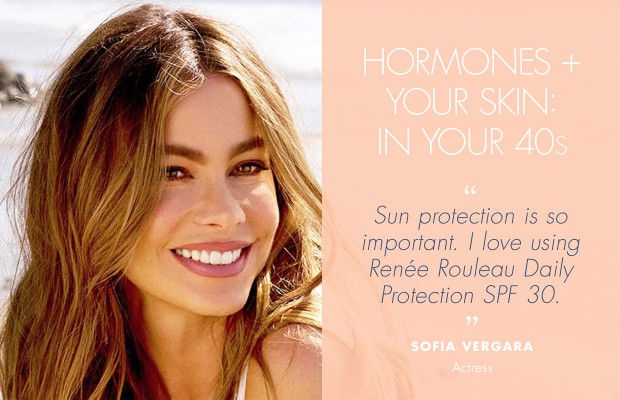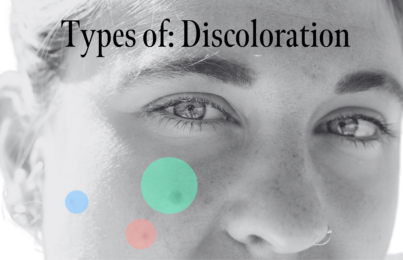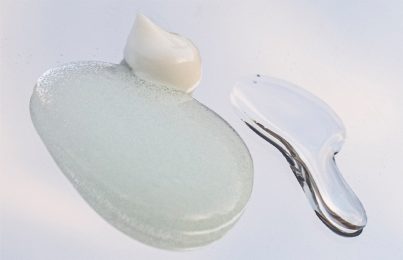Updated 3/20/19. Intrinsic aging is determined by heredity, your genetic programming on a cellular level that controls the hormones responsible for aging. The skin will behave differently under the influences of these hormones, but how will you be affected from ages 40-50?
- How is the skin affected by hormones during the ages of 40-50?
- Expert tips for getting your skin to look more radiant, firm and smoother in your 40s
- Get serious about caring for your skin by adding in a few more steps in your skin routine
- Look for ways to manage facial hair and peach fuzz
- Get plenty of sleep so your skin can repair properly
- Use high-performance ingredients like retinol and exfoliating acids to improve your skin’s texture
- Keep the skin glowing by using skin care products with energy-boosting ingredients
- Adjust your skin care routine if rosacea appears
- Use a natural skin brightener to visibly fade brown spots and discoloration
- Load up (inside and out) with antioxidant-rich foods and skincare products
- Drink alcohol in moderation
- Always choose products for YOUR skin type
- Get professional skin care treatments
- Wear sunscreen every single day—even when indoors or on cloudy days
- Avoid yo-yo dieting and frequent up and down weight loss
- Get adult hormonal breakouts under control
- Don’t neglect your neck
- For a deeper dive into your hormone-related concerns, consult with an endocrinologist
The 40s are the peri-menopausal years which is the stage of aging before actual menopause. These are the years when estrogen is slowly starting to decline and because of this, you’ll experience changes in the skin’s texture as well as loss of tone and increased facial hair. In this post, I’ll go into detail about the hormonal shifts taking place and share my expert tips for things you can start doing now to counteract the visible effects. (I’m age 49-1/2, so I know this decade all too well.)
How is the skin affected by hormones during the ages of 40-50?
- Progesterone (regulates sleep, immunity and brain function)
- Estrogen (supports collagen production which is responsible for keeping the skin plump and free of wrinkles)
- Testosterone (regulates oil glands and hair growth)
- DHEA (protects against oxidative stress which is an important function in preventative skin aging)
- Human growth hormone (supports skin’s elasticity and muscle)
Not in your 40s? Read how hormones affect the skin in your teens, 20s, 30s, 50s and 60s.
The decrease or change in these hormones is a main factor in the intrinsic aging process and will all play a part in the visible aging of the skin.
Peri-menopause is when estrogen slowly starts to decline. Estrogen is very involved in the normal function of the skin. It directly affects the function of key cells in the skin like the fibroblasts (produces collagen and elastin), keratinocytes (closely involved in skin protection) and melanocytes (involved in evenness of skin color, etc.). It also helps regulate hair follicle function (hair production) as well as sebaceous gland activity (producing skin oils). While the hormones affect the skin gradually during your 40s, you’ll notice the quality of the skin is changing significantly.
The environmental aging from past sun exposure in your younger years is now becoming increasingly visible. Lines around the eyes, between the eyebrows, on the forehead, and around the mouth are all more prevalent. Brown spots start to appear and around age 45, you can start to notice a loss of volume and tone in the skin. The face will start to form what is known as jowls; sagging skin in the chin, neck and jawline area. Hormonal swings tied to aging account for an increase in facial hair (peach fuzz), especially on the cheeks and upper lip.
The peri-menopausal years also trigger skin growths like these on the face and body. They begin as small, rough bumps and over time, they thicken and get larger. There are many names for these: seborrheic keratoses, actinic keratoses, skin tags, sebaceous hyperplasia, and they all can appear a bit different (some brown, some flesh color) but generally speaking, they are bumps, excess skin, enlarged oil glands and growths that protrude from the skin and become impossible to hide with makeup.
In the last one to two years of peri-menopause (age 48-49), the decline in estrogen accelerates. At this stage, many women experience menopausal symptoms.
Expert tips for getting your skin to look more radiant, firm and smoother in your 40s
Get serious about caring for your skin by adding in a few more steps in your skin routine
By the 40s, hopefully, you’ve already committed to a good skin care home care routine. For best results, your regimen should go beyond the basic steps of cleansing, toning and moisturizing and include the addition of a few extra steps. This might include using an eye cream and a skin serum every morning and night. You would also greatly benefit from using an at-home peel and mask once a week to give your skin added results by keeping it smooth, supple and even-toned. When you put in the extra effort, you’ll get the reward of healthier-acting and younger-looking skin.
Look for ways to manage facial hair and peach fuzz
When the skin has a lot of light hairs, it’s not going to look as smooth or be as glow-y as you want it to be. Plus, liquid foundation makeup is harder to blend in when the skin is fuzzy. Waxing, shaving, dermaplaning or threading are all options to consider to keep visible hair less noticeable. These are all considered safe methods of hair removal and will NOT encourage increased hair growth.
Get plenty of sleep so your skin can repair properly
From a stress management standpoint as well as a way to keep your skin in good shape, quality sleep is essential. Did you know that collagen production is accelerated during sleep? If you are consistently sleep deprived, not enough collagen is produced to replace what inflammation will naturally break down. During the deepest stage of rest, growth hormones peak and stimulate cell and tissue repair. Beauty sleep is a must in your 40s!
Use high-performance ingredients like retinol and exfoliating acids to improve your skin’s texture
Keeping the skin looking younger longer is all about prevention, so during your 40s is a good time to introduce potent and proven formulas to visibly slow down how quickly the skin shows aging. Smoothing ingredients like peptides, acids, and retinol will help boost cell metabolism, plump skin and stimulate fibroblast to lay down new collagen. It’s never too late to introduce these types of products but the sooner you do it, the better.
Keep the skin glowing by using skin care products with energy-boosting ingredients
This includes ingredients such as vitamin B3 (niacinamide), rosemary and ginseng, which all work to give the skin a pick-me-up. When applied topically to the skin, these ingredients help allow the skin to accommodate more nutrient-rich blood and oxygen. With continued use, you can get skin that looks radiant from inside out.
Adjust your skin care routine if rosacea appears
If someone is going to get rosacea (a genetic condition associated with redness and visible capillary activity on the face), more than likely it will peak in their 40s.
Use a natural skin brightener to visibly fade brown spots and discoloration
Did you know that melanocyte cells decrease about 10% every decade after the age of 30 which results in irregular pigmentation? Using a natural skin lightener is really important to fade brown spots. Also, researchers have found that when you use a serum containing both vitamin C and E underneath sunscreen, it helps to provide four times the protection of sunscreen alone. There are many types of vitamin C (ascorbic acid, alpha lipoic acid, and l-ascorbic acid are a few examples) but I have found that tetrahexyldecyl ascorbate works best for fading discoloration and it’s the one I have chosen to use in my formula.
Load up (inside and out) with antioxidant-rich foods and skincare products
It is widely recognized by almost every doctor, skin researcher and health professional on the planet that the key to aging in a healthier way is to protect your cells with antioxidants. This is known as the free radical theory of aging. This theory states that the main reason why we age is that unstable electrons in molecules known as free radicals attack healthy cells and change their composition. These free radicals are very potent toxins that ultimately damage the skin. First, they attach to proteins and other essential molecules, making the molecules unable to function normally, as healthy, younger cells do. This ultimately results in the premature death of the attacked cells. Sounds tragic, I know.
Free radicals can come from UVA and UVB rays from the sun, pollution, stress smoking, alcohol, fatty foods, and even aerobic repetitive exercise. When exposed to these, the parts of the cell susceptible to damage are DNA, lipids, and proteins. This, then, slows down the production of collagen and elastin, which is essential in keeping the skin firm and preventing wrinkling. This entire process happens beneath our skin every minute of every day, making wrinkles, brown spots and sagging more visible over time.
The good news is that antioxidants found in products (such as stabilized vitamins A, C and E) are incredibly effective at slowing the process of visible aging. They’re so effective because antioxidants essentially prevent free radicals from oxidizing molecules.
In addition to specially formulated products, eating vegetables and fruits will give your body antioxidants internally. When consumed frequently, they’re a natural, inexpensive way to slow the signs of aging from inside out. The best ones are avocados, berries, sweet potatoes, broccoli, spinach, tomatoes, and carrots. A diet rich in color is going to benefit both your skin and body.
Drink alcohol in moderation
Regular, habitual, excessive drinking will visibly age your skin faster. Overconsumption of alcohol causes chronic inflammation and harmful free radical activity, as mentioned above. This gradually wears on connective tissues, resulting in flaccid, loose, sagging skin. Moderation is key.
Always choose products for YOUR skin type
Your friend may tell you about some fabulous product that she loves or you’ll read in a magazine about a product that a celebrity uses, but that doesn’t mean it will work for your skin. The main reason you may not show improved results is that they aren’t suited to your skin’s specific needs. If you’re still buying products based on the basic dry, normal and oily skin types (and your skin is anything but that!), look at these nine skin types or simply take this Skin Type Quiz. It will help you learn what your skin really requires for it to look and feel its best.
Get professional skin care treatments
Especially in the 40s when the signs of aging are settling in due to hormone changes, putting your skin in the hands of a professional is so important to give a boost of results. Skin care products at home will play their part but professional treatments like facials, micro-current, lasers and chemical peels all work to give a lot of improvement. Botox and dermal fillers are options, too but read this first.
Wear sunscreen every single day—even when indoors or on cloudy days
Research indicates that 78% of all sun damage incurred in a lifetime is from incidental exposure. It’s all those times when you don’t think you’re getting sun because you aren’t out there long enough to actually get a tan. Driving in the car and walking down the street on a cloudy day is still very damaging to your skin. Just because you don’t purposely seek out a tan doesn’t mean you’re not getting the sun’s harmful rays. On days that are spent indoors, you’re still getting the damaging rays coming through windows in the form of daylight. Wear a sunscreen built into your moisturizer, applied to both your face and neck, every day, 365 days a year, rain or shine, inside or out. It’s the easiest and most effective way to slow down how quickly your skin will visibly age.
Avoid yo-yo dieting and frequent up and down weight loss
Since the metabolism of the body slows down with age, it’s certainly more challenging once you get into your 40s to keep weight off. As much as possible, you want to maintain a consistent weight. When you fall into yo-yo dieting, it can throw your hormones out of balance, increasing production of the stress hormone cortisol. Too much cortisol causes inflammation, which ages you. As for the skin, it has elasticity similar to that of a rubber band. When it’s stretched out too many times, it can stop bouncing back and leave the skin saggy.
Get adult hormonal breakouts under control
By now, you should be getting fewer breakouts now that oil production has slowed down but It is still common to get breakouts in your 40s. It’s all hormonally induced—especially if they are hard, cystic bumps that develop deep within the skin and linger for weeks. Read how to prevent adult hormonal breakouts.
Don’t neglect your neck
This area is often overlooked and will start to show the effects of aging and sun damage in your 40s. Applying sunscreen generously to the front and sides of the neck is one of the best ways to prevent premature aging, so be sure to get into this habit daily when performing your morning routine. Here are more of my expert tips to repair the look of sun damage on the neck and chest.
For a deeper dive into your hormone-related concerns, consult with an endocrinologist
This is a special kind of physician who specializes in hormonal issues. Aside from changes in your skin, it’s normal in your 40s to have other disruptions. An endocrinologist can run all sorts of tests to provide specialized help for those who have constant hormone fluctuations.
Celebrity Esthetician & Skincare Expert
As an esthetician trained in cosmetic chemistry, Renée Rouleau has spent 30 years researching skin, educating her audience, and building an award-winning line of products. Her hands-on experience as an esthetician and trusted skin care expert has created a real-world solution — products that are formulated for nine different types of skin so your face will get exactly what it needs to look and feel its best. Trusted by celebrities, editors, bloggers, and skincare obsessives around the globe, her vast real-world knowledge and constant research are why Marie Claire calls her “the most passionate skin practitioner we know.”




Comments:
Question I’m 47 and have very dry facial skin I fo get breakouts every now n yhem but how do i get my face back to the way it use to look in my 30’s
Posted By: Storm |
Hi! I would recommend taking our skin type quiz to find out which of the 9 skin types you are. This way you can get specific product recommendations for your skin. If you still find yourself struggling, you can book a virtual consultation with one of our estheticians. They will be able to answer questions about your skin and give you personal recommendations. Hope this helps!
Posted By: Renée Rouleau |
I’m 38 yrs old and I work as a nurse and have 3 boys age range from 18,12, 4, I have been have pimples and blacks alot lately, and along my jaw line ,chin and sometimes cheeks ,, lots of black heads on my nose , I have very good hygiene, and take good care of myself ,but gosh these are terrible .what should I be doing ,
Posted By: June |
Clogged pores and breakouts is not related to lack of good hygiene. You can read my blemish posts here.
Posted By: Renée Rouleau |
question.
ever since i started using this product (over a month now) my blackheads on my forehead and chin area especially have increased. Is this common for this product? I cant figure out what else i have changed to cause the blackheads and i heard alot of vitamin c could cause that?
Posted By: amber |
I think you’re referring to our Vitamin C&E Treatment? While you are correct that vitamin C can cause blackheads but it’s only certain kinds of vitamin C. The unstable forms of vitamin C that contain pure l-ascorbic acid or ascorbic acid can do that for people with larger pores and oily, acne-prone skin. It’s not too common but it can happen. But our Vitamin C&E Treatment is completely stable and in fact, it can help them so I’m surprised to hear that you’re feeling like you’re getting more. I really don’t know why that would be. Be sure you’re exfoliating well and regularly as that is always beneficial for lessening them. Read this post that talks about getting rid of blackheads.
Posted By: Renée Rouleau |
I would like to know why I’m still breaking out regularily and body acne in my late 40s? I eat a very healthful diet, mostly all my own home cooking, exercise and shower daily. Also I drink 8 glasses of water a day, about 3 cups including green tea. Still my skin does not behave as it should for its age. Thanks, Carol.
Posted By: Carol |
Hello Carol, Unfortunately, eating healthy and doing all the good habits you do is not a cure or a prevention for acne. Breakouts are simply much more complicated then that. More than likely, it’s something hormone related. It’s very common, I see it all the time. Read my posts about back breakouts and blemishes here.
Posted By: Renée Rouleau |
Why in skin type 7 is there no product for rosacea or retinol product when retinol is spoken so much of on your site for anti aging?
Posted By: jasmine |
Skin type #7 is not a routine recommended for rosacea. Skin Type #9 is the sensitive/rosacea-prone skin type and our retinol serum is recommended in that routine at night. See it here https://www.reneerouleau.com/skin-types/9/complete
Posted By: Renée Rouleau |